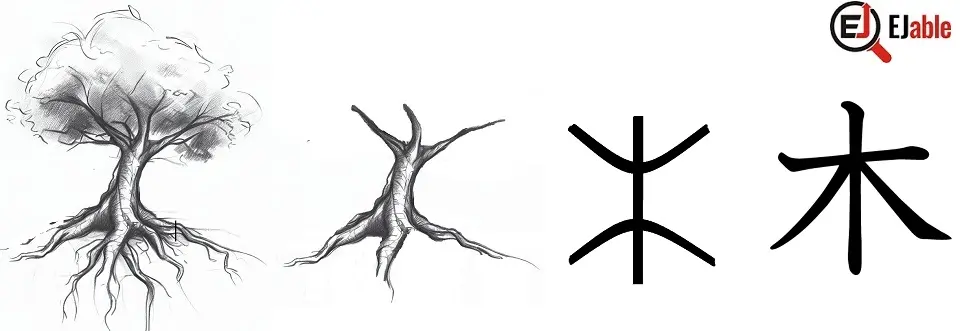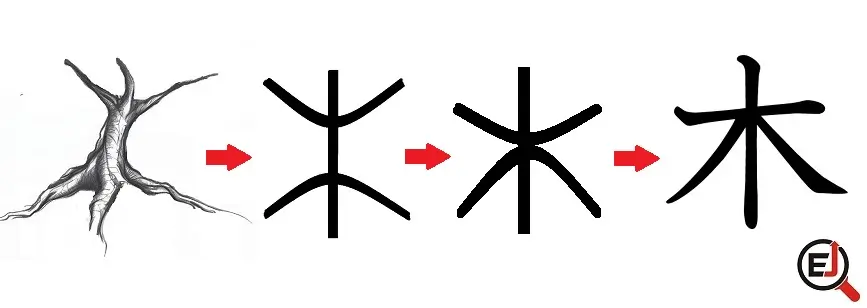[ad_1]
The kanji for forest in Japanese is 森 (mori). This character is actually a visible illustration of a forest.
Origin of the Forest Kanji 森 (Mori)
The kanji 森 is comprised of three 木 (ki) characters. The character 木 represents a single tree, and while you put three collectively, it signifies a gaggle of timber, therefore a forest. The visible concept is kind of easy: one tree makes a tree (木), two timber make the Kanji for a grove (林), and three timber make a forest (森). The intelligent stacking of tree symbols to point a rising density of timber supplies a easy, but efficient, visible interpretation of the time period ‘forest.’
So, the form of the kanji is supposed to visually characterize a dense stand of timber, as you’d discover in a forest. It’s a chief instance of what number of Kanji characters are pictographic or ideographic, visually representing the idea they stand for.
It’s vital to notice that the kanji 森 is not only a visible illustration. It’s additionally a logo that has cultural significance in Japan, a rustic with many forests. Forests in Japan are sometimes related to tranquility and spirituality, as they’re the house of kami (gods) in Shinto beliefs. Due to this fact, the kanji 森 carries with it a way of the cultural and religious significance of forests in Japanese tradition.
Forests and Japanese Tradition:
The symbolism of 森 goes past its pictographic roots. In Japanese tradition, forests maintain a deep religious and cultural significance. In Shintoism, Japan’s indigenous faith, forests are thought-about sacred areas and residential to kami (gods or spirits). Many Shinto shrines are located inside or near forests, additional cementing the affiliation between forests and the religious world. Consequently, the kanji 森 carries connotations of tranquility, spirituality, and reverence, reflecting the deep cultural ties between the Japanese individuals and their pure environment.
Within the Japanese language, 森 extends its affect past standalone use. It varieties the basis of many compound phrases and phrases, influencing their meanings and connotations. For instance, 森林 (shinrin) interprets to ‘woods,’ emphasizing the vastness and density of a forest. Equally, 森林浴 (shinrinyoku) is a compound phrase which means ‘forest bathing,’ a therapeutic exercise centered on spending time in a forest for well being advantages.
The kanji 森 is an illustration of the interaction between language, tradition, and nature. It’s a personality that tells a narrative – a narrative about Japan’s lush forests, their cultural significance, and the tranquility they characterize. By delving into the depth of a single character, we will acquire a profound understanding of the symbiotic relationship between language and tradition.
Learn how to Bear in mind the Kanji Forest or Mori (森)
Recalling the Kanji for ‘tree’ or ‘ki’ simplifies the method of studying the Kanji for ‘forest’. It primarily consists of three ‘tree’ characters, offering a vivid depiction of a forested space.
Nonetheless, it’s vital to keep in mind that the Kanji 森 isn’t precisely a composition of three particular person ‘Ki’ Kanjis or 木. Somewhat, it’s an clever mixture of three radicals of the Kanji 木 for a tree, making a unified Kanji. The article discussing the Kanji 木 (Ki) presents useful suggestions for remembering this character.
This acquainted depiction will support in understanding and remembering the Kanji 森, symbolizing ‘forest.’ In your comfort, the visible illustration of the origin and evolution of the Kanji 木, please discover the identical visible illustration of the origin and evolution of the Kanji 木 as follows:

Simplification of the Form of 木

森 in Compounded Japanese Phrases
The Kanji for forest, i.e., 森 is utilized in many different compounded phrases. Following are some compound phrases that use the kanji 森 (“Mori”) for “forest”:
- 森林 (shinrin): Forest
- 森田 (Morita): A standard Japanese household title
- 海森 (umimori):Seaweed forest (a casual, non-dictionary time period)
- 森林浴 (shinrinyoku): Forest bathing, or the follow of taking a leisurely stroll in a forest for well being advantages
- 森神 (morijin): God of forest
- 森鳥 (moridori): Forest chicken
- 山森 (yamamori): Mountain forest
- 森閑 (shinkan): Deep quiet (as within the deep quiet of a forest)
- 森厳 (shingen): Strict, extreme, solemn
- 森立つ (moritatsu): To face thick (as timber in a forest)
- 森羅万象 (shinrabanshou): All issues in nature, the entire creation
- 森人 (moribito): Forester
- 森風 (morikaze): Forest wind
- 森永 (Morinaga): A Japanese sweet firm
- 森ガール (mori gaaru): “Forest woman”, a Japanese trend fashion that goals for the looks of a fairytale forest wanderer
Do not forget that in Japanese, kanji don’t all the time correspond to particular person meanings inside phrases, and sometimes their use could be understood extra as a illustration of a broader idea or as a method to evoke sure imagery or concepts.
Do test different Kanji characters on the web page “Learn how to Study and Bear in mind Kanji“.

An extended-term ex-pat in Japan, Himanshu comes with an IT background in SAP consulting, IT Enterprise Growth, after which working the nation operations of an IT consulting multinational. Himanshu is the co-founder and Managing Director of ReachExt Okay.Okay. and EJable.com. He’s additionally an Advisory Board Member of a Silicon Valley AI/IoT startup.
[ad_2]